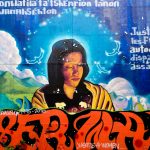Selloane Moeti paints the black woman’s journey
The multi-award winning fine artist and performer draws strongly on her dreams and spirituality to create inspiring portraits of female strength and worth.
Author:
11 March 2020

“I am committed to challenging the stereotypes and marginalisation of black women in South Africa,” says visual artist Selloane Moeti, who draws on her spirituality to create her artworks.
“The final work people see on the canvas involves a strenuous process. My late grandmother was a spiritual healer who passed on the gift to my mother. The generational spiritual healing gift was also presented to me. I transform the messages relayed to me by my ancestors through visual art.”
Sketches of tall-necked, mystical shadows in black ink fill the notepad pages of this Durban-based visual artist and performer. She draws women in curves and crowns, as symbols of deity, warrior and divinity. Many of these sketches are drawn from her snake-themed dreams. When she finally transmits them into portraits, they become striking oil paintings embellished with red clay. The red-clay faces in her paintings symbolise purification.
Related article:
“I am constantly trying to decode the symbols and images in my dreams,” says Moeti. “The dark, snake-like figures represent my ancestors [and] paired with the use of ibomvu (red clay) [they] signify physical and spiritual awakening, chronicles of becoming.”
Moeti’s paintings represent a young black woman’s journey into becoming, overcoming and healing. Her art explores the political and social issues that black African women born into a patriarchal culture face. Through her work, she is gradually amplifying women’s rights, gender equality, African spirituality, and the social and political culture and ideologies that continue to infringe on women’s rights and sideline their voices.
“My work has deliberate intention. To evoke emotions, challenge the norms and remind women of their real worth, the women in many of my paintings represent the black modern goddess,” the artist says.

Finding her purpose
Moeti’s upbringing is rooted in Sotho and Zulu culture. She adorns some of the figures in her portraits in Basotho tribal attire.
“Through the journey of trying to find my lineage, I have had to accept many realities that black women are exposed to,” she says. “Our voices, faces and spaces are screaming for healing.
“To embrace this gift requires a lot of groundwork for proper preparation. This means that black South African women still need to fight twice as hard for recognition in the art space and in their communities. The struggle to be heard as an equal voice in society is still undermined and highly politicised. Our space is limited and, as we fear for our lives daily, our progress is therefore hindered. Walking the streets is an extreme sport.”
Related article:
Moeti was born in eMagabheni, a small township south of Durban. She was raised in a time of political unrest. Her father was a member of uMkhonto weSizwe, the ANC’s armed wing. A permanent home was impossible. “I don’t even remember how many times we moved homes. It was hard to make friends. Eventually my younger sister and I were the only friends we needed,” she says.
“My father never had a son; he had five daughters. I spent all my life trying to be my father’s son. Although the relationship with my father eventually collapsed, he has always [been] a predominant factor in my artworks and performances.”
Moeti says it was only after 2016 that she re-emerged as a visual artist with the purpose to begin the critical discussions on the “dislocation and relocation” of black women in society. “After taking a break from my art, I realised I had to ‘listen’. My ancestors had a distinct message that required my undivided attention. Now, my work is strategised. The purpose of my work is clarified.

A woman’s worth
Moeti graduated with a degree in fine arts from the Durban University of Technology in 2009, majoring in painting and sculpture. A multi-award winning visual artist, she is one of the founders of community-based initiative SketchIn’, a figure-drawing project aimed at empowering young artists in rural KwaZulu-Natal and providing a space where they can share and improve their craft.
She has used vivid colours and surrealism in her recent work. The elongated necks and mythical creatures carry metaphoric undertones that challenge the negative perceptions of black women in African customs. A strong message of feminine power soars throughout her art pieces as Moeti often works in the realms of femininity, identity and spiritual healing. In a painting she was working on, she uses a cow as metaphor that symbolises the value placed on women’s ‘heads.’
“The cow represents the commodified value that has been enforced into women through some traditional practices. It is also a metaphor for all that we carry. Women, we carry families, the struggles of poverty daily. Most importantly, women carry these crowns with grace and bravery, something that needs to be continually emphasised. Life begins with us. Embracing that becomes a task because you realise you must do a lot of internal work before bearing the responsibility.”
Related article:
To Moeti, the messages in her artworks are more important than the works being sold. “I am lucky enough to have a full-time job. This allows me complete and pure dedication to my art’s purpose. I want my art to be able to connect and communicate with the ordinary black woman, contemporary and traditional. Women need to feel comfortable in every space they occupy and to be able to question and challenge any injustice,” she explains.
Although she uses surrealism in her work, she wishes for it to be clear enough for interpretation. “When I realised the impact my work had on other women and how they received my messages through my paintings, I never wanted to look back. I had my first solo performance and exhibition at the Underline show in Johannesburg in 2019. I cried in the bathroom for at least 20 minutes. The spiritual arrangement during that day was overwhelming, heavy and draining. That’s when I realised my work was much more than just art. I was able to reach out to other women and I could feel them relate and be moved through my work.”

Carving out a rightful place
Moeti says female creative artists who are working to challenge the oppressive perceptions of black women have a tough task ahead of them. She is part of a notable group of artists using their work to interrogate various ways in which black women can challenge their subjugation.
“We don’t have the privilege to be mediocre or playful because we are now playing catch-up. The limitations we encounter in societal spaces and professional art spaces require us to be fierce and adamant in making our voices notable and louder than before. The aesthetic and social value of feminised and political art is of critical importance in our context, 25 years into democracy.”
However, Moeti does affirm that things in the art space are getting better, alluding to the work of renowned artist Mary Sibande, who continues to produce some of the most interesting perceptions of black women.
Through the art of healing, Moeti stays true to her spiritual path, a transformational process to help find her identity, and to make space, insistently, for black women in the contemporary South African art world.



